
Die Kinder der Heide(The Children of the Moorland) is a four-act opera by Anton Rubinstein, to a libretto by Salomon Mosenthal, based on a verse novel by the Hungarian poet Carl Beck.

Die Kinder der Heide(The Children of the Moorland) is a four-act opera by Anton Rubinstein, to a libretto by Salomon Mosenthal, based on a verse novel by the Hungarian poet Carl Beck.
Whilst working on the opera in 1859, Rubinstein wrote to a friend:
I have absolutely no luck with opera texts. I have wasted a lot of time and money and everything has been unusable.[...] I am hoping that with my present attempt, I shall have more luck, and then the world will have something novel in store! [1]
He also told Franz Liszt that he hoped to have the opera premiered in Vienna, where in fact it was eventually produced in 1861 - most of the opera was written in Dornbach, not far from the capital. [2] The opera's first performance in Russia was in 1867.
| Role | Voice type | Premiere Cast, 23 February 1861, Kärntnertor Theatre, Vienna |
|---|---|---|
| Count Waldemar | tenor | Gustav Walter |
| Conrad, an innkeeper | baritone | Hrabanek |
| Maria, his daughter | soprano | Gabrielle Krauss |
| Wania, a herdsman | tenor | Aloys Ander |
| Isbrana, a gypsy | mezzo-soprano | Csillag |
| Gypsies, villagers, soldiers, etc | ||
The location is a Hungarian village.
Wania is Isbrania's lover; she tells him of a planned robbery of Conrad's inn, which Wania foils. Conrad offers him as a reward his daughter Maria in marriage.
Maria confesses to her father that she is in love with a mystery man, who turns out to be Count Waldemar. Waldemar and Isbrana conspire to interrupt the marriage ceremony.
Finding Maria with the Count, Wania fights and kills him. He is helped to escape by Isbrania and the gypsies.
In a forest hideout, Wania is visited by the grieving Conrad and Maria, who has gone mad. Wania prevents the gypsies from robbing them as they depart. Soldiers arrive to arrest Wania; when he refuses to escape with Isbrania she stabs herself and dies.
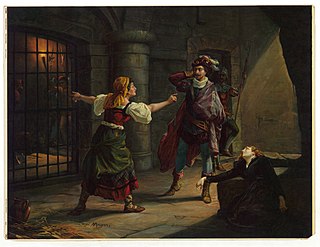
Il trovatore is an opera in four acts by Giuseppe Verdi to an Italian libretto largely written by Salvadore Cammarano, based on the play El trovador (1836) by Antonio García Gutiérrez. It was García Gutiérrez's most successful play, one which Verdi scholar Julian Budden describes as "a high flown, sprawling melodrama flamboyantly defiant of the Aristotelian unities, packed with all manner of fantastic and bizarre incident."
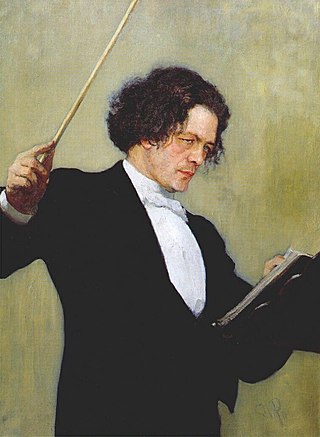
Anton Grigoryevich Rubinstein was a Russian pianist, composer and conductor who founded the Saint Petersburg Conservatory. He was the elder brother of Nikolai Rubinstein, who founded the Moscow Conservatory.

The Barber of Seville or the Useless Precaution is a French play by Pierre Beaumarchais, with original music by Antoine-Laurent Baudron. It was initially conceived as an opéra comique, and was rejected as such in 1772 by the Comédie-Italienne. The play as it is now known was written in 1773, but, due to legal and political problems of the author, it was not performed until February 23, 1775, at the Comédie-Française in the Tuileries. It is the first play in a trilogy of which the other constituents are The Marriage of Figaro and The Guilty Mother.

Dimitri Marick is a fictional character from the American ABC soap opera All My Children. The role has been most notably portrayed by Michael Nader, previously famed for his role on Dynasty. Former head writers Agnes Nixon and Lorraine Broderick created the character in 1991, designing him as a brooding and mysterious character based on heroes from gothic literature, such as Maxim de Winter from Daphne du Maurier's novel Rebecca and Heathcliff from Emily Brontë's novel Wuthering Heights. The character's introduction raised All My Children in the Nielsen ratings and was credited as the "saving grace" of the unpopular Natalie and Janet storyline.
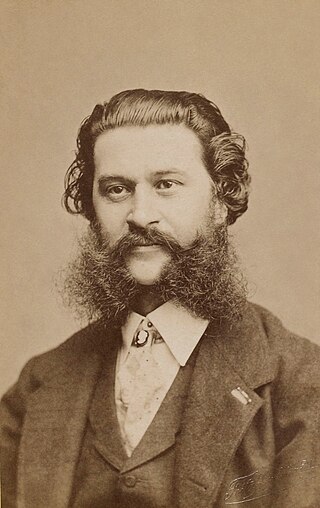
The Gypsy Baron is an operetta in three acts by Johann Strauss II which premiered at the Theater an der Wien on 24 October 1885. Its German libretto by Ignaz Schnitzer is based on the unpublished 1883 story Saffi by Mór Jókai. Jokai later published a novel A cigánybáró in 1885 using an expanded version of this same story.

The Bohemian Girl is an Irish Romantic opera composed by Michael William Balfe with a libretto by Alfred Bunn. The plot is loosely based on a Miguel de Cervantes' tale, La gitanilla.

Tiefland is an opera in a prologue and two acts by Eugen d'Albert, to a libretto in German by Rudolf Lothar. Based on the 1896 Catalan play Terra baixa by Àngel Guimerà, Tiefland was d'Albert's seventh opera, and is the one which is now the best known.
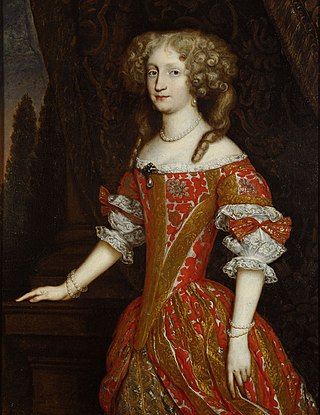
Eleonore Magdalene Therese of Neuburg was Holy Roman Empress, German Queen, Archduchess of Austria, Queen of Hungary and Bohemia as the third and final wife of Leopold I, Holy Roman Emperor. Before her marriage and during her widowhood, she led an ascetic and monastic life, translating the Bible from Latin to German and defended the Order of the Discalced Carmelites. Reputed to be one of the most educated and virtuous women of her time, Eleonore took part in the political affairs during the reign of her husband and sons, especially regarding court revenue and foreign relationships. She served as regent for a few months in 1711, period in which she signed the Treaty of Szatmár, which recognized the rights of her descendants to the Hungarian throne.

El Retorno de Walpurgis is a 1973 Mexican-Spanish co-production horror film that is the seventh in a twelve-film series about the werewolf Count Waldemar Daninsky, played by Paul Naschy. This film ignored the events in all of the earlier Wolf Man films and began an entirely new origin for el Hombre Lobo, which is strange because the film's Spanish title The Return of Walpurgis seems to tie it in with Naschy's earlier 1970 film Walpurgis Night. The Wolf Man makeup was done by Fernando Florido. The film was shot in June 1973, and by September, it was already in theaters in Spain, as El Retorno de Walpurgis. It wasn't released theatrically in the U.S. however until 1976, as Curse of the Devil.

Maria Nikolaevna Kuznetsova, also known as Maria Kuznetsova-Benois, was a 20th century Russian opera singer and dancer.

The Fortune Teller is an operetta in three acts composed by Victor Herbert, with a libretto by Harry B. Smith. After a brief tryout in Toronto, it premiered on Broadway on September 26, 1898, at Wallack's Theatre and ran for 40 performances. Star Alice Nielsen and many of the original company traveled to London, where the piece opened at the Shaftesbury Theatre on April 9, 1901, running for 88 performances. It was revived in New York on November 4, 1929, at Jolson's 59th Street Theatre, starring Tessa Kosta, and ran for 16 performances. The piece continued to be revived, including by the Light Opera of Manhattan in the late 20th century and the Comic Opera Guild in the early 21st century.

Demon is an opera in three acts by Russian composer Anton Rubinstein. The work was composed in 1871. The libretto was by Pavel Viskovatov, based on the poem of the same name by Mikhail Lermontov.

Princess Charlotte of Württemberg, later known as Grand Duchess Elena Pavlovna, was the wife of Grand Duke Michael Pavlovich of Russia, the youngest son of Emperor Paul I of Russia and Duchess Sophie Dorothea of Württemberg.

Désirée Artôt was a Belgian soprano, who was famed in German and Italian opera and sang mainly in Germany. In 1868 she was engaged, briefly, to Pyotr Ilyich Tchaikovsky, who may have coded her name into works such as his First Piano Concerto and the Romeo and Juliet Fantasy-Overture. After her 1869 marriage to the Spanish baritone Mariano Padilla y Ramos, she was known as Désirée Artôt de Padilla or Désirée Artôt-Padilla.
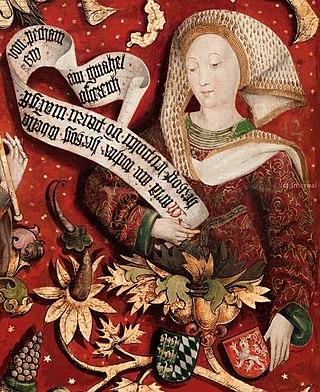
Maria of Bohemia, a member of the Přemyslid dynasty, was Margravine of Austria and Duchess of Bavaria by her first marriage to Duke Leopold I, as well as Margravine of Baden and Verona by her second marriage to Margrave Herman III.

Die Maccabäer is an opera in three acts by Anton Rubinstein to a libretto by Salomon Hermann Mosenthal. The opera is based on a play by Otto Ludwig, which is itself based loosely on the biblical story of the Maccabees. Written in 1872–74, it was first performed on 17 April 1875 at the Hofoper, Berlin. Censorship problems prevented its performance in Russia until January 1877.
Anton (Antal), Prince Esterházy de Galántha was a prince of Hungary, a member of the wealthy Esterházy family. He is primarily known for his patronage on composer Joseph Haydn.

Néron (Nero) is a grand opera in four acts by Anton Rubinstein to a libretto by Jules Barbier, loosely based on the story of the Roman Emperor Nero.

Fomka the Fool is a one-act opera by Anton Rubinstein to a libretto by M. L. Mikhaylov. It was given its only performance in 1853.

Dmitry Donskoy(Russian: Дмитрий Донской), also known as The Battle of Kulikovo was the first opera written by Anton Rubinstein. It has three acts and a libretto by Count Vladimir Sollogub and Vladimir Zotov, based on a drama by Vladislav Ozerov. First performed on April 18, 1852 at the Bolshoi Opera House, and then followed by three more performances, the opera, apart from its overture, is now lost.